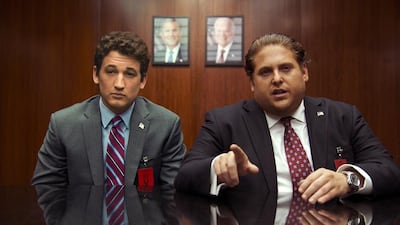Director: Todd Phillips
Stars: Miles Teller, Jonah Hill, Bradley Cooper
Three stars
With the Hangover trilogy, director Todd Phillips proved himself an expert at celebrating white, American, male buffoonery – and he hits a similar rollicking and entertaining tone in War Dogs.
He takes the serious subject of arms dealers supplying troops in the Middle East and plays it for laughs – and partly succeeds. But this throwaway, comedic style is a problem when trying giving to give the film any real substance.
Focusing on the comedy allows Phillips to ignore the tougher questions the story raises. More troubling, it makes it easy for the film to play up to the regional stereotypes that are common in Hollywood films about conflicts in the Middle East, which cloud questions of war crimes, culpability and policy-making, while lauding flawed Americans as heroes.
War Dogs was inspired by a 2011 Rolling Stone article, Arms and the Dudes by Guy Lawson, and the basic plot of the film is neatly summarised by the online headline to the story: The Stoner Arms Dealers: How Two American Kids Became Big-Time Weapons Traders.
In the film these "kids", David (played by Whiplash star Miles Teller) and Efraim (Jonah Hill), are portrayed as a Laurel and Hardy-style comedy duo.
The story is told from the point of view of David, an unsuccessful entrepreneur who combines his day job as a Miami Beach masseuse with selling Egyptian cotton bed sheets to retirement homes. His world is turned upside down by the reappearance of old school friend Efraim, who introduces him to the American military's free-for-all online procurement process, which was used by the Bush administration to source arms to send to the mostly local fighters in Iraq and Afghanistan. Hill is highly amusing in a role that has major echoes of his turn in the 2013 movie The Wolf of Wall Street.
Efraim is a money-grabbing entrepreneur who idolises Al Pacino's Scarface character, Tony Montana. Yet what he and the War Dog filmmakers forget – or ignore – is the fact that Scarface is a morality tale. Tony Montana pays dearly for his terrible crimes.
In an effort to keep War Dogs light and funny, David is given a soft heart and a story arc that offers the chance of redemption.
So, for example, he has a pregnant partner to provide for by selling arms, rather than just being selfish, materialistic and greedy. These domestic scenes are lacklustre, with Ana de Armas playing his stereotypical disapproving girlfriend.
While most of the arms industry’s corruption and deceit is blamed on Americans, the film nonetheless still manages to reinforce the clichés of evil East European gangsters and Arab madmen.
As a Jordanian fixer helps guide Davis and Efraim through Iraq’s triangle of death, the protagonists are almost killed by faceless Arabs shooting at them for no reason whatsoever – and when they are rescued (by the American military of course) the punchline sees the fixer scream “Allahu Akbar”.
While Arabs and Eastern Europeans are demonised, the filmmakers look somewhat more forgivingly upon much of the criminality conducted by the American protagonists.
In doing so, the film presents the American intervention in Iraq in much the same way it portrays David: well-meaning, intending no harm – and if he commits criminal acts, we should forgive him, even if there is no obvious sign of remorse.
In American cinema, it is curious how there remains such a massive contrast in the way wars in the Middle East have become vehicles for comedic entertainment, compared with the critical deconstruction of the Vietnam War. At the trial of the real-life Efraim Diveroli, Judge Joan Lenard said: “If it wasn’t so amazing, you would laugh”.
By making us laugh, the filmmakers largely avoid the amazing aspect or any kind of judgment – but that’s entertainment for you.
artslife@thenational.ae


